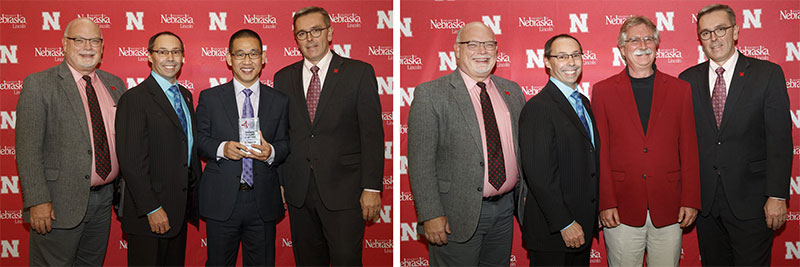
Congratulations to Yuguo (Leo) Lei (CHME) and Stephen Reichenbach (CSE), who were honored at the Nov. 9 NUtech Ventures 2017 Innovator Celebration at Nebraska Innovation Campus.
Chancellor Ronnie Green and interim vice chancellor for research and economic development Steve Goddard spoke at the event, which highlighted this year’s NUtech Ventures Innovation Celebration Awards recipients and the 43 UNL inventors who were issued US patents during fiscal year 2017.
Awards presented to engineering faculty included:
* Emerging Innovator of the Year: Yuguo Lei, assistant professor of chemical and biomolecular engineering, for invention of novel devices for cell manufacturing that can be used for personalized medicine.
* Startup Company of the Year: GC Image, founded by Steven Reichenbach, professor of computer science and engineering. GC Image provides industry-leading software solutions for visualizing, analyzing, and reporting on data from comprehensive gas chromatography systems.
For more about the 2017 Innovator Celebration Awards and videos highlighting the research and work done by the winners, go to:
http://www.nutechventures.org/2017-innovator-celebration/
- - - - - - -
The next generation of agricultural technologies and systems to meet the growing demand for food, fuel and fiber is the focus of three research projects within the Department of Biological Systems Engineering that are among the 17 projects nationwide selected for USDA funding.
Three BSE faculty -- Yufung Ge, assistant professor; Joe Luck, associate professor; and Christopher Neale, professor and director of the Robert F. Daugherty Water For Food Global Institute -- each have a project announced Oct. 17 as a grant winner by the National Institute of Food and Agriculture's (NIFA) Agriculture and Food Research Initiative (AFRI).
"Technology is front and center in agricultural production," said NIFA Director Sonny Ramaswamy. "NIFA is investing in research on precision and smart technologies to maximize production efficiencies, including water and fertilizer use, and to produce nutritious food, new biofuels and bioproducts."
The projects focus on high-resolution depth sensing of soils, next-generation spray drift mitigation and variable rate irrigation technology. Work in these areas has already been established and with support from AFRI, Nebraska researchers can continue to develop these technologies.
"Three of the 17 agricultural technology projects recently funded by the USDA are led by Nebraska's Biological Systems Engineering Department, which is a testament to the innovative approach by our researchers," said David Jones, interim department head of biological systems engineering. "Through these research projects, we will be able to bring the latest engineering technology to Nebraska's biological systems."
-----------------
The expertise and resources at Nebraska’s Holland Computing Center helped researchers around the world study the collision of two neutron stars.
Data of the astronomical milestone was collected through both gravitational waves and the visual spectrum. The event, detected by the LIGO-Virgo Scientific Collaboration and a number of telescopes, heralded the beginning of the multiple-messenger astronomy era — which is based on coordinated observation and interpretation of electromagnetic radiation, gravitational waves, neutrinos and cosmic rays.
“This is like going from a silent movie to suddenly having sound and color,” said Brian Bockelman, research assistant professor in computer science and engineering. “There were a lot of astronomical questions wrapped up in this event.”
Article in ORED Annual Report: http://news.unl.edu/newsrooms/today/article/holland-computing-center-aids-gravitational-wave-discovery/
-----------------
A team that includes Nebraska Mechanical and Materials Engineering researchers -- assistant professor Benjamin Terry, professor Carl Nelson and doctoral graduate Hossein Deghani -- have developed a "soft" robot that could make colonoscopy procedures less invasive, less uncomfortable and less expensive.
Deghani led the design of the robot, which includes a camera that is attached to a latex tube that is inflated with air once the robot is in the colon. The result is having a robot that deforms itself during the procedure, thus reducing pain and discomfort to the patient.
This device was featured in the annual report published by The University of Nebraska-Lincoln Office of Research and Economic Development.
http://research.unl.edu/annualreport/2017/soft-robot-could-improve-colonoscopies/
-----------------
A team of engineering students and faculty from the Nebraska Industrial Assessment Center (NIAC) are gaining valuable experience while helping a utility and a business in Hastings become more efficient.
A Hastings Tribune article (link below) recounted the team's work in early November with Hastings Utilities' Pollution Control Facility and during the summer at the Thermo King plant.
Headed by Robert Williams, associate professor of mechanical and materials engineering; Bruce Dvorak, professor of civil engineering; and George Gogos, professor of mechanical and materials engineering -- NIAC has been awarded a U.S. Department of Energy (DOE) grant of more than $1.4 million to help small manufacturers use energy more efficiently and train engineering students in energy management and manufacturing processes. The NIAC is one of 21 Industrial Assessment Centers around the country.
Hastings Tribune article: http://www.hastingstribune.com/news/hu-gets-outside-advice-from-unl-engineering-team/article_f1a3b076-c323-11e7-916a-93b54de0627e.html
NIAC website: https://engineering.unl.edu/iac/